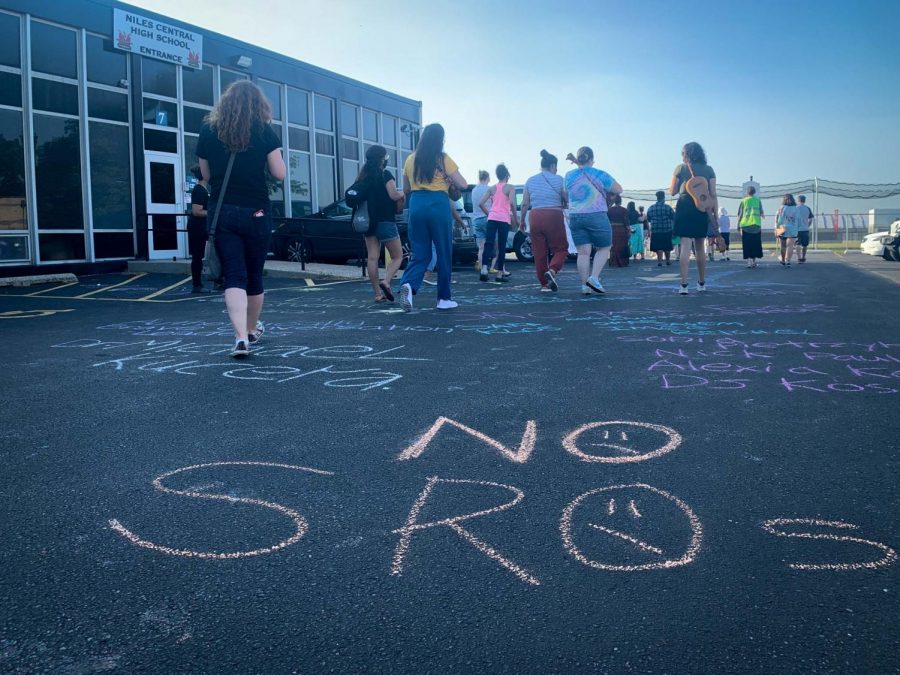Skokie Schools Equity Collaborative, Abolition Coalition host anti-racist celebration and protest of SROs in D219
Nick Francis/Daily Senior Staffer
“No SROs” written on the pavement outside the Niles Township High Schools District 219 district offices. Community members used sidewalk chalk to write anti-racist messages during the celebration.
June 15, 2021
About 50 community members gathered with Skokie Schools Equity Collaborative and the Abolition Coalition of Skokie outside Niles Township High Schools District 219 offices before a June 8 Board of Education meeting to celebrate anti-racist activism and protest school resource officers in District 219.
Organizer Maggie Vandermeer of Skokie Schools Equity Collaborative said the protest came after the resignations of two Black District 219 leaders: board President James Specker and Chief Technology Officer Oyin Idowu. Initially, the meeting’s agenda included a vote on the future of the district’s intergovernmental agreement with the Skokie Police Department, which activists hoped would result in the removal of SROs from the district, Vandermeer said.
“Tonight, we hoped that a vote would finally be made and justice granted to our community,” she said. “Racism had other ideas.”
Due to Specker’s resignation on June 4, Vandermeer said the board would instead have to discuss how to fill the vacancy of Specker, “yet another Black school leader.”
The crowd — including families, community members and district teachers — held signs and chanted “Keep Black staff” and “SROs have got to go,” until the meeting began.
When the meeting started in a closed session, the group listened to a District 219 teacher, a Niles West High School student and event organizers give speeches on the ongoing racism within the district.
Michael Nabors, president of Evanston/Northshore NAACP, in partnership with the Abolition Coalition, said the rally was the third the group helped organize. The issues have remained consistent since the first, which occurred in January, he said.
In January, Nabors said activists stood in the same spot, concerned about the resignations of administrators and teachers of color, as well as the injustices students are experiencing in District 219. He said with all the resources available in the district, the academic disparity between Black and brown students and White students shouldn’t continue to widen.
“All children are the same,” Nabors said. “All children should be given every opportunity to scale the mountain top of excellence when it comes to education.”
During her speech, Vandermeer said this opportunity disparity extends past the student body.
She said anti-Blackness within the district is a self-perpetuating pattern which continually leads to low retention of Black staff and leaders.
“Without Black leadership, you will continue to lose amazing Black teachers and support staff and administration and board members,” Vandermeer said. “Without Black leadership, White supremacy will grow like a cancer.”
During her speech, Abolition Coalition member Jasmine Sebaggala spoke on the racism Black and brown employees in District 219 “surely experienced” as children.
She said it wasn’t until graduate school that she could speak on her own experiences.
“We live our entire life knowing that no matter how hard we work, and how much we know, that there are some people that will mistreat, exclude, harass, disrespect, underestimate and misrepresent us just because of the amount of melanin that we possess,” Sebaggala said.
For Nigerian-born Niles West junior Emmanuela Anyanwoke, being a Black student brings a sense of alienation. She said her accent is in many cases unrecognizable by her peers, leading her to often stay silent rather than repeat herself.
As a member of Niles West’s Black Student Union, Anyanwoke was the only student to deliver a speech that night. She began by saying she doesn’t like speaking in public.
But after she finished her address, she was cheered vigorously, and Sebaggala hugged her tightly. To the organizers, the gathering was not just centered around action — it was a celebration — and they emphasized feelings of joy and accomplishment, recognizing their achievements of the past year.
About a third of the event’s attendees were also children — some played cornhole, while others covered their hands in paint, writing “No SROs” on posterboard. While live music played, attendees distributed beverages and tangerines, and children were encouraged to decorate the sidewalk with colorful messages.
Vandermeer told The Daily celebration is a form of protest. Self-preservation, after a year of working for change, she said, are acts of defiance against oppressors who take the opportunity for enjoyment away from marginalized communities.
“When you’re doing this work all the time, it’s very taxing,” she said. “And I think it’s important to celebrate.”
Email: [email protected], [email protected]
Twitter: @oliviagalex, @nick24francis
Related Stories:
— Black and brown parents pressure D219 board to address racism
— Abolition Coalition of Skokie, Evanston/Northshore NAACP lead rally against police brutality


